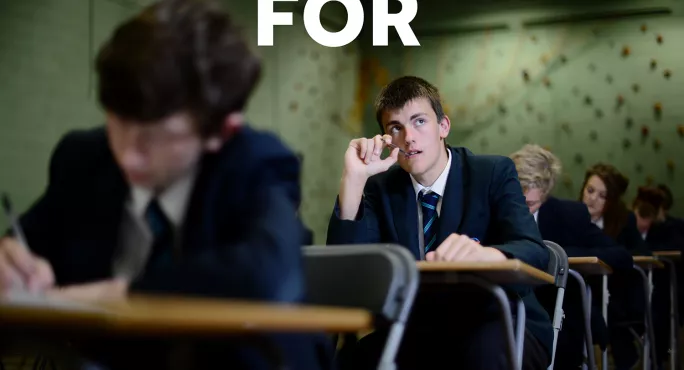- Home
- ‘Yes to more tests: More formal exams will leave students feeling like they’ve done this before, and can do it again’
‘Yes to more tests: More formal exams will leave students feeling like they’ve done this before, and can do it again’

In a break between things on Wednesday afternoon, I came across a conversation on Twitter that piqued my interest. It was about something Nick Gibb had said somewhere that day. I couldn’t initially see what he’d spoken about, but from the reaction of some I figured he must have proposed the reintroduction of corporal punishment or adding kitten-bashing to the Early Years framework.
“Hmm,” I thought, “Nick is a pretty mild-mannered guy. What has he said this time?!”
I was pretty bemused to discover that the comment he’d made that was causing accusations of child abuse, mental health trauma and the like, was that students’ resilience to external exams could be built up by them experiencing more low-stakes “formal” exams before they do the real thing.
[Read the case against, here.]
I was pretty taken aback at the online response - and the fact that his comment made the front page of The Times yesterday - because what he actually said seems like common sense to me and probably every other person who works in education:
“Exam pressures have always been there, and the way to deal with exam pressure is to make sure that young people have taken exams earlier on in their school career - at the end of Year 7, Year 8, and so on - so they are used to taking exams.”
After all, sitting GCSE and A-level examinations are just a fact of life in this country. They are a significant and formative part of teenage years, and for some will be among the biggest few hours in their lives to date. While messing up your GCSEs isn’t irretrievable, there’s no getting away from the fact that these exams are important - and success in them helps set up a child for the next stage in life.
The value of testing
Harder qualifications are like hard currencies: they have greater credibility - and are more valuable and more widely accepted, as a result. They open more doors to those who pass them. Let’s not forget, the kids who most benefit from this are those who haven’t been blessed with the other things that lubricate access to places and positions of power, such as school alumni networks - and family wealth and connections.
Given that tough exams are an important currency for accessing future opportunities, the question is how do we best prepare our students for them, so as many as possible can succeed?
Why wouldn’t we ease children into the habit of low-stakes but “formal” exams, instead of dropping them in the deep end when the important ones come around? Headteachers and their teams aren’t sadists looking to make kids miserable by testing - they do it to help them when the time comes.
Getting used to sitting in the big exam hall, learning to write quickly and under pressure, to manage time and to keep answers as concise and clear as possible - all of these vital exam skills and more can be developed through end-of-year exams or whatever. They can be done in an environment where it’s OK to make errors and learn from them, with minimal fuss. (Probably as much of the benefits to resilience will emerge from making mistakes as from successes.)
Part of preparing
Key to maximising the upsides is the culture within which the students learn. If learning is admired, academic success expected and planned for, staff-student relationships strong - and stoicism embraced - then exam periods can be a really upbeat time for all concerned.
I’ve met people over the years who are or who have been Olympic athletes, musicians or performed on stage. They’ve all mentioned the stress they went through during the years of training and practice they did, but they’ll also mention how it was a key part of preparing, so that when they had to perform for real, they knew what to expect and could be in “the zone” and not overthink things.
And let’s be clear, the kids at private schools will have done all these things. They’ll be used to exams - and confident in their abilities. If we want our state schools to be the best in the country - and why shouldn’t they be? - then our students deserve the same quality of preparation. If we don’t give them this, they’re miles behind before the race has even started. And none of these things require unbearable levels of stress on students or, just as importantly, their teachers. (Yes, we have to consider the workload impact of exams, and so use them sparingly.)
Of course, our kids will still be nervous come their real GCSEs and A levels. No mock exams can ever fully prepare you for the real thing. But they can make a huge difference and help make sure that the nerves and stress on one shoulder are met by a quiet confidence and self-belief on the other. A feeling that you’ve done this before and you can do it again, no matter the stakes. For Nick Gibb to point this out shouldn’t be a surprise or controversial, as many of us in the system have done this for years and seen the benefits.
Mark Lehain is the founder and former Headteacher of Bedford Free School. He is now director of Parents and Teachers for Excellence
Want to keep up with the latest education news and opinion? Follow Tes on Twitter and like Tes on Facebook
Keep reading for just £1 per month
You've reached your limit of free articles this month. Subscribe for £1 per month for three months and get:
- Unlimited access to all Tes magazine content
- Exclusive subscriber-only stories
- Award-winning email newsletters


